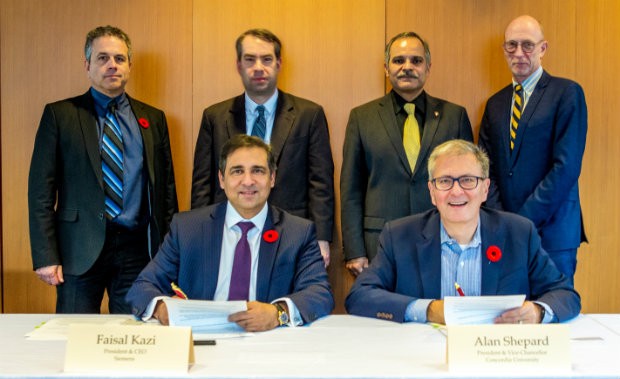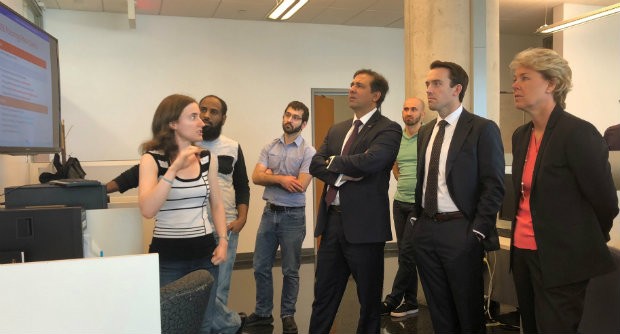Concordia’s Gina Cody School and Siemens Canada enter into MOU
 Concordia University president Alan Shepherd and Siemens Canada president Faisal Kazi sign a memorandum of understanding for greater collaboration on disruptive technologies.| Photo by Concordia University
Concordia University president Alan Shepherd and Siemens Canada president Faisal Kazi sign a memorandum of understanding for greater collaboration on disruptive technologies.| Photo by Concordia University
Leadership from Concordia University, its Gina Cody School of Engineering and Computer Science, and Siemens have drafted and signed a memorandum of understanding to collaborate on projects that advance their mutual academic, business and social goals in the areas of cyber security, autonomous and net-zero buildings, decentralized energy systems, CO2 reduction and preparing the workforce of the future.
With a common interest in testing big ideas that address tomorrow’s biggest challenges, representatives from Concordia and Siemens met back in June and reflected on how they could enhance their collaboration, building on a history of community and industry engagement. After their meeting the Siemens team took the time to visit the Cyber Security lab at Concordia University.
 Mourad Debabbi, professor in the Concordia Institute for Information Systems Engineering and his graduate students demo the results of their cybersecurity research with Lisa Davis, Managing Board Member of Siemens AG and Chair and CEO of Siemens Corporation, USA, on June 17, 2018. | Photo courtesy of Stephane Chayer
Mourad Debabbi, professor in the Concordia Institute for Information Systems Engineering and his graduate students demo the results of their cybersecurity research with Lisa Davis, Managing Board Member of Siemens AG and Chair and CEO of Siemens Corporation, USA, on June 17, 2018. | Photo courtesy of Stephane Chayer
“Cyber security is a black and white topic simply because there is no option but to deal with it, explains Stephane Chayer, vice president and country business lead for Building Technologies and Government Affairs Quebec at Siemens Canada, “Only by working together will we be able to find the most effective solutions.”
Siemens has a well-established relationship with Concordia supporting the cutting-edge research of engineering and computer science researchers with equipment installed in the award-winning TeamMTL Solar decathlon house and plans to introduce it to future lab space for the chemical and materials engineering and aerospace engineering. Concordia also uses the company’s building systems and living lab technologies across campus.
“I truly believe that organizations such as Siemens have a responsibility to work with higher education institutions to ensure that tomorrow’s workforce will excel in a high-tech economy,” says Kazi.
“Our hands-on and work-integrated learning in aerospace, health, cities and advanced manufacturing prepares today’s students to work with tomorrow’s technologies,” explains Amir Asif dean of the Gina Cody School, ”and we are excited at the opportunity to pursue a closer collaboration with Siemens.”
